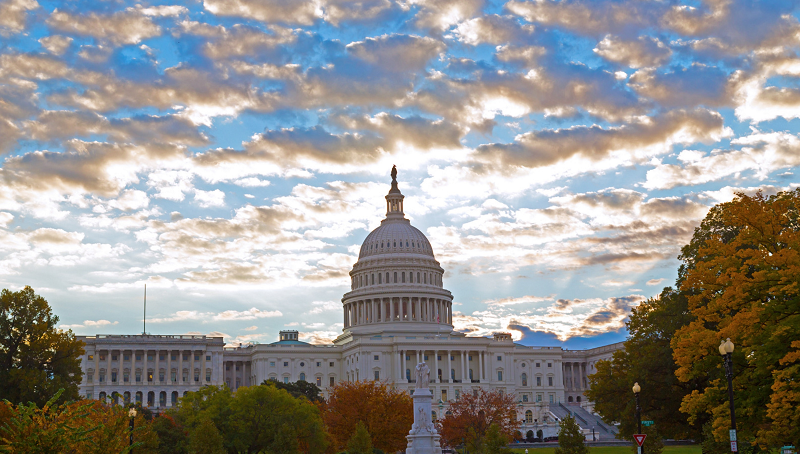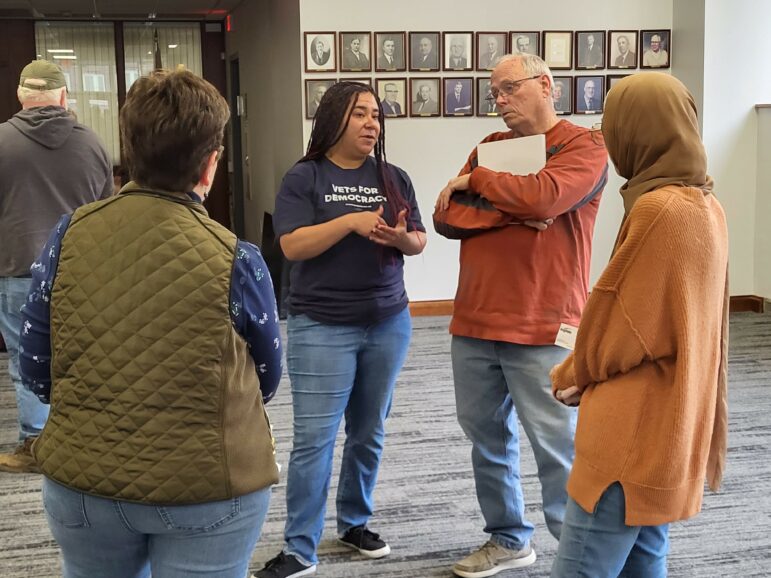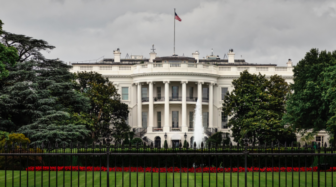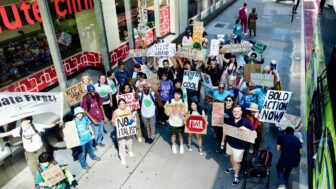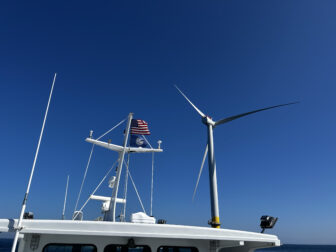On an unseasonably warm and sunny winter day, Chesapeake Climate Action Network and Solar United Neighbors visited the Eastern Panhandle of West Virginia to deep dive into the details about the Inflation Reduction Act. Our goal was to help folks realize the potential benefits of this bill and how it could personally impact their lives.
However, if you would have told me this day would come in July of last year, I might not have believed you. You see, CCAN started advocating for this bill in the early summer of 2021 when it was still called the American Jobs Plan. And we didn’t stop fighting for it as it underwent its many name changes and compromises to bend and evolve until a certain West Virginian Senator decided it was palatable. It was a disheartening time, being strung along for almost two years, trying every possible action we could imagine. But we never gave up. We agreed that no matter what happened, we wanted to be able to say “We left it all on the field.” Even when a lot of other organizations were sure there was no hope, we worked hard to keep the faith alive.
Shortly after celebrating the passage of this bill, we started to brainstorm ways that we could distill the massive amount of information contained within the IRA without overwhelming people. We know this federal investment is amazing, but unless folks are educated in how to tap into these programs they won’t be able to reap the benefits!
Bringing the Roadshow to Martinsburg
The desire to connect individuals and communities to these programs led to the birth of the Inflation Reduction Act Roadshow. Our first event held at the Martinsburg Public Library had a cross section of attendees, including engaged citizens, small business owners and impassioned advocates. Folks snacked on delicious food, chatted with one another and participated in a dynamic discussion and question-and-answer session after the presentation.
Later, we held a similar presentation online—you can watch it at this link. But read on for a summary of a few key takeaways:
Benefits for you: Making it easy to go electric!
The clearest way the IRA will help individual households is by providing funding to go electric, by switching your household heating and cooking systems to electric, retrofitting for efficiency, switching to electric cars, and even going solar.
Household electrification
Many homes run on gas for heating and cooking purposes. The IRA helps you switch to electric with direct and indirect financial assistance. Here are a few examples—but watch the webinar to learn more, or check out Rewiring America’s handy IRA benefit calculator.
- Switching to an electric/induction stove: Rebates cover 100 percent for low-income households and 50 percent for moderate-income households for costs up to $840
- Heat pump water heater: Rebates cover 100 percent for low-income households and 50 percent for moderate-income households for costs up to $1,750
- Weatherization: Rebates cover 100 percent for low-income households and 50 percent for moderate-income households for costs up to $1,600
- Electrical panel: Rebates cover 100 percent for low-income households and 50 percent for moderate-income households for costs up to $4,000. On top of this, rule 25C provides a 30 percent tax credit for an electrical panel upgrade capped at $600 per year when combined with another upgrade covered by 25C (like a heat pump or water heater)
Electric vehicles
- Tax credits up to $7,500 for new electric cars will continue indefinitely
- Tax credits of up to $4,000 for used electric cars
Go Green
- Putting solar panels on your home has never been easier! The bill extends a 30% residential solar tax credit for 10 years
- Standalone residential battery storage now qualifies for this 30% tax credit too
Benefits for the climate
The IRA turbocharges the clean energy industry in many ways, like by allowing nonprofits, public schools, faith-based organizations, local governments, tribal governments, rural electric co-ops, to receive 30% off new solar panels through direct payment. All told, the policy will cut annual emissions in 2030 by an additional one billion metric tons!
Benefits for the economy
Jobs, jobs, jobs: this policy results in JOBS. By boosting funding for major programs, the IRA will add:
- Five million jobs in the clean energy sector
- Nearly 380,000 jobs in agriculture to support farmers using regenerative practices
- More than 50,000 jobs to help coastal communities protect themselves from sea level rise and storms
- More than 100,00 jobs to restore our forests
- More than 20,000 new jobs in the National Parks program
And much, much more! Watch the whole presentation here:
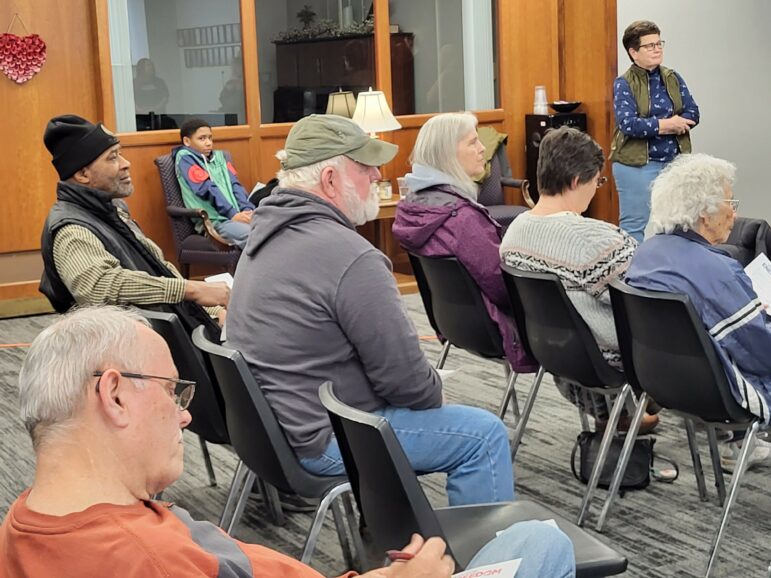 The evolution of this legislation was long and storied, with many changes as the bill progressed through Congress. The IRA Roadshow gave an opportunity for West Virginians to receive the most up-to-date and relevant information for their families and communities. But we’re here to provide human connection to legislation that happens in what sometimes seems like the faraway land of Washington, DC. By joining forces with SUN we were able to provide information and field questions that highlight the benefits of sensible, people-driven policy and how it can impact West Virginians and the nation as a whole in meaningful and sustainable ways.
The evolution of this legislation was long and storied, with many changes as the bill progressed through Congress. The IRA Roadshow gave an opportunity for West Virginians to receive the most up-to-date and relevant information for their families and communities. But we’re here to provide human connection to legislation that happens in what sometimes seems like the faraway land of Washington, DC. By joining forces with SUN we were able to provide information and field questions that highlight the benefits of sensible, people-driven policy and how it can impact West Virginians and the nation as a whole in meaningful and sustainable ways.
Our inaugural event in Berkeley County was a success and we are looking forward to future Roadshows across West Virginia, Virginia, Maryland and DC.
If you, your organization or municipality would like to host an event like this, please don’t hesitate to contact our West Virginia organizer, Holly Bradley (holly@chesapeakeclimate.org) or our federal policy director, Quentin Scott (quentin@chesapeakeclimate.org).

